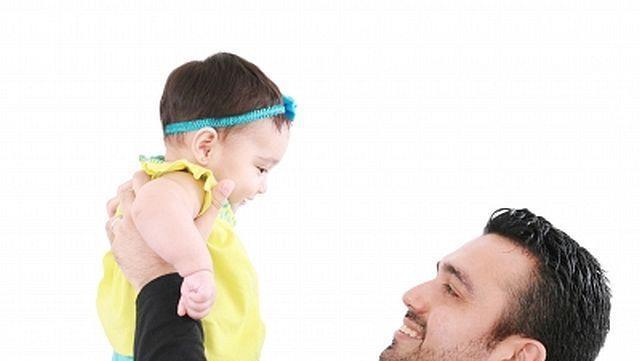Did you know that parents' love and care can also affect their child's intelligence? According to a study in the UK, every day parents just spend 1 hour playing and talking with their children can stimulate their child's brain development. At the same time, the test results also show that the IQ of these babies will be 10-15 points higher than other children.

Make time to play with your baby every day
1 / Mount with your baby
The brain is designed to seek security so it cannot learn anything if it is unsafe. This is why parents need to build a sense of safety for their baby. Communication, conversation, and massage for your baby will help establish this awareness.
First-time moms may find it difficult for first-time mothers because of long sleepless nights, staying indoors and doing a job that you have absolutely no experience with. And this will easily put anyone under stress. But do not ruin the close relationship between you and your spouse because this is also one of the best ways to help your baby feel safe.
Researchers suggest that both parents should write and agree to divide the chores together. The husband's sharing in this moment is extremely meaningful. If both of you have accidentally quarreled right in front of the baby, you should both rebuild a sense of safety for the baby by reconciling in the presence of the baby. Children do not understand words but will be affected by their parents' feelings.
2 / Tell stories to your baby
Experts believe that mothers should talk as much as possible with their baby. While we rarely share thoughts out loud, emitting information in sounds will help develop a baby's language skills early on.
The baby 3 years old speak will have high IQ versus 1.5 times the baby is not talking. Reading, spelling, and writing skills will improve by entering elementary school. The number of words, the variety and complexity of words and the way you use them will help nurture and develop your baby's language skills.
Tones in the voice are also very important. In particular, the mother's voice is a great way to help the baby's brain absorb language. Separate melodies with high tones make it easier for babies to imitate. However, it is common for parents to tend to be less talkative when their child starts to babble. Don't let your silence make things useless, talk more for your baby.

6 things you should not ignore if you want your child to be smart Many scientists have shown that, apart from genetic factors, there are many other factors that can affect your child's intelligence. You should pay special attention to the following things in order not to miss the opportunity to help your baby smarter!
3 / Spend time with your baby
Many studies show that babies begin to recognize facial expressions of their parents at about 3 or 4 months of age. Around 5 months old, babies can understand emotions on the face of an unfamiliar person.
Scientists believe that emotions are one of the baby's first channels of communication with us. Understanding facial expressions is the foundation of non-verbal communication skills , helping children to be better at teamwork, less competitive and establish long-term relationships as an adult.
Therefore, parents should spend a lot of time with their baby to help develop this skill well. However, the brain also needs to rest, if the baby is distracted and looks around, do not try to force him because his brain needs a few minutes to process the information he has received.

Helping children develop brain through daily communication
4 / Limit the wheelchair
Children lying in the crib, sitting in the stroller too much will limit their ability to move. There are many babies for safety reasons, so they have to lie in cribs, push too many stroller, not to mention the time spent in the car. In fact, babies need to respond freely to surrounding stimuli. Therefore, babies need to be able to move freely to observe both in front, beside or behind them.
This is the first stage of your baby's focus development so it is very essential. Babies need to follow eye and ear cues as well as warning signs.
5 / Point to objects when teaching children
Research shows that children learn language more quickly if their parents point at an object and pronounce the word. Initially, your baby will only look at you, but gradually they will look at their fingers and around 9 months, most babies will begin to follow their fingers and focus on objects.

Nurturing your baby's intelligence and potential Why are there children who are good at math but find it difficult to choose a word to express their thoughts? Why are there children who draw better than their friends? The theory of 8 types of intelligence is probably the most appropriate explanation for mothers in these cases. Capture this kind of intelligence also ...
From about 9 to 10 months old, babies begin to know to show you things. These are the "communication triangles", showing your child is developing cognitive abilities related to you and another object (or someone) out of the world, you and your baby.
What can parents do to develop this skill for their baby? Continue pointing to the things around your baby and talking about them. Your baby may not understand what you are saying, but your communication with your baby needs to get complicated little by little. You can go to the zoo with your baby, go to the barn, point in there and describe. This will help your baby promote social development and language awareness.















